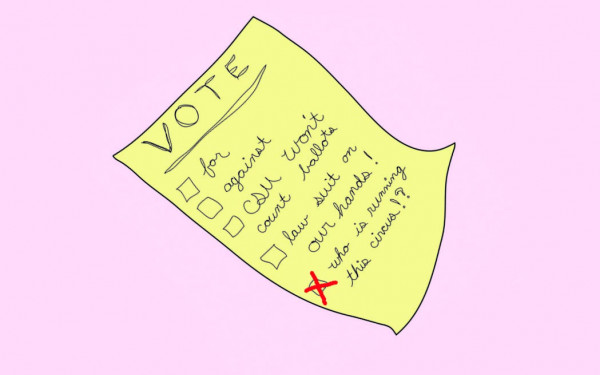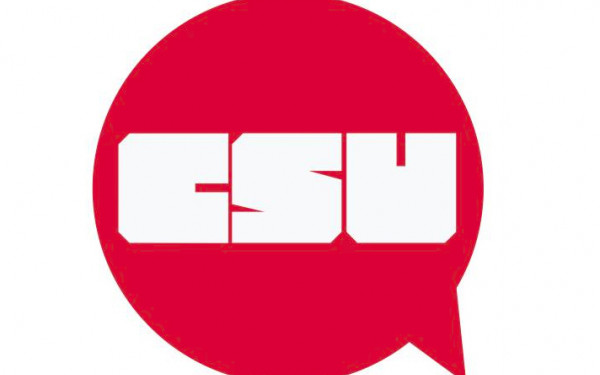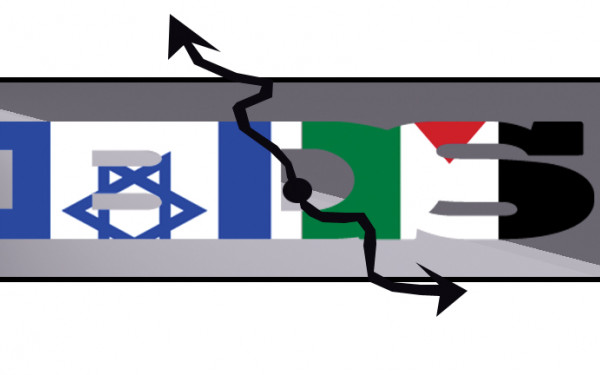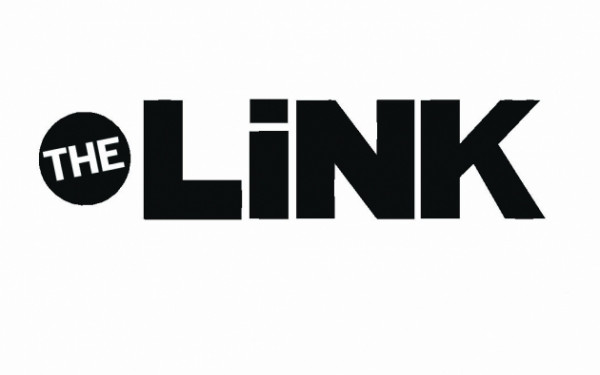Will the BDS Ballots Ever Be Counted?
Vote Count Suspended Indefinitely After “Overwhelming” Number of Complaints
After weeks of campaigning, hundreds of Concordia University students voted on the Boycott, Divestment and Sanctions referendum question this past week. But the ballots for the controversial question have not been counted and there’s still a chance they never will be.
The vote count’s indefinite suspension on Thursday was announced in an email by Andre-Marcel Baril, the Concordia Student Union’s Chief Electoral Officer, who said there was an “overwhelming” amount of “complaints” about the referendum question.
An independent firm that practices law and specializes in “interpreting specific institution bylaws and regulations” will be consulted for future action, according to Baril. The firm’s name has not been disclosed and a budget to hire the firm has been approved by the CSU, he added.
“For important issues like this, I think there should be something set up—like a support system—where it’s not just one person’s responsibility,” Baril told The Link.
“Whereas I’m organizing staff, organizing ballots, dealing with issues related to other candidates—then to have on top of that this big issue—it’s just really hard to find the time to sit down and think objectively about that problem.”
The CEO added that he is “optimistic” the ballot count will happen, but throwing out the question entirely remains a possibility, albeit an “extreme” one.
“I personally would not say there’s a moratorium on this,” Baril continued. “My recommendation would be to go to election again with some more regulations.”
Javier Hoyos, the chair of Concordians in Support of BDS, told The Link that the Concordians United Against BDS group benefits more from a potential cancellation of a count. He acknowledged that the CEO was facing “a lot of pressure.”
On Monday night last week, the CSU Judicial Board reviewed whether the wording of the question was “prejudicial to the outcome of the referendum.”
The question, which was the result of two edits by Baril, asked, “Do you approve of the CSU endorsing the Boycott, Divestment and Sanctions (BDS) movement against Israel’s occupation of Palestine until Israel complies with International Law and Universal Principles of Human Rights?”
The JB did not find that question to be biased. Nonetheless, due to the “sensitive nature of the issue,” it decided to use an alternate question—one also written by Baril—which stated, “Do you approve of the CSU endorsing the Boycott, Divestment and Sanctions (BDS) movement against Israel?”
“That [alternate] was a horrible question. It was pretty much asking, ‘Do you hate Israel?’ That’s how we see it,” Hoyos said. “We did not ask that question. That’s what people see when they go to the ballot.
“We were campaigning against Israel on their human rights violations and violations of international law.”
The Judicial Board chair Zach Braman told The Link that the new question incorporated the “most reasonable, clear and least ambiguous” phrasing. The board, made up of five members, reached a unanimous consensus.
The reason the Judicial Board meeting did not happen earlier was because a CSU regulation states that the emergency window for appeal is only available 24 hours prior to voting. Baril said that this was probably created to better deal with issues regarding candidates rather than referendum questions. He already wrote a recommendation to change its time period in his evaluation report.
“I think the idea of pushing [the emergency window] back a week when you’re talking about a referendum question—especially when you’re talking about changing it—it would be a very responsible thing to do,” Baril said.
Zach Ross, a member of the Concordians United Against BDS committee, said that Baril’s second edit—which produced the previous version of the ballot question tossed aside by the JB—violated CSU by-laws. He said they were not notified of a change to the referendum question at least seven days prior to the voting.
He added that his group continued campaigning with the previous question for “four days” after its release. Based on this accusation, Ross originally called for the cancellation of the question completely.
Baril denied the accusation and said that he publicly posted the altered, previous iteration of the question on Nov. 16 at 8:15 p.m., which is more than seven days removed from the voting period.
The CSU CEO provided evidence in the form of a timestamp of his post on his personal website. He added that he did not directly contact any member from the Concordians United Against BDS committee after the change. On further review, he said that he understood their complaint.
“To be entirely frank, that was also at a time where things were happening and I didn’t have the legal or bylaw responsibility [to tell them],” the CEO told The Link.
“It would have helped the process a lot and yes, I do think I should have done them that favour.”
Ross also said that the previous iteration mentioned a “vague” timeline for how long the boycott will last, that it did not define what constitutes Palestine’s borders, that there were no parameters for how the CSU will conduct a boycott, and no “universal principles of human rights” were explicitly available for reference anywhere.
With the change to the alternate question, new, separate ballots had to be printed late into Monday night.
The new ballots did not have removable tabs like the ones the other referenda were printed on. Baril said there is “no requirement anywhere in the regulations” for every ballot to have a detachable tab, which called into question the reason for their presence in the first place.
“The only thing it needs to have is to be labeled with specific serial numbers and it has to say which number of the referendum questions it is,” Baril told The Link about requirements for a ballot.
The CEO added that the whole process has been “completely transparent.”

_900_597_90.jpg)





